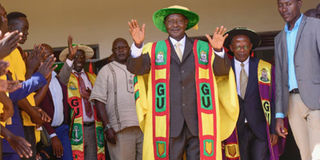Museveni re-echoes focus on science courses, research

President Museveni (centre), and the State Minister for Higher Education, Mr John Chrysostom Muyingo (2nd right), with other officials during the graduation ceremony at Gulu University at the weekend. Photo by PPU
President Museveni has warned public universities against wasting time and resources on what he called ‘meaningless courses’ and instead focus on science ones and research.
“I want 100 per cent staffing for science courses in all public universities and the funds we give are enough, the only problem comes in when you bring in all these courses that do not add value instead of prioritising science,” the President said while speaking at the 15th graduation ceremony for Gulu University at the weekend.
Mr Museveni also advised institutions to produce professionals in agriculture, industries and ICT sectors where Uganda’s biggest challenges of housing, food, transport, communication and service provision still lie.
Concern
“The courses you are running here at the university, which problems of the society will you solve? If you answer this question carefully, you will appreciate the courses you are giving to learners here. Don’t train people just because we have a university, but they should be able to solve society problems,” Mr Museveni said.
His statement was in response to an appeal by the Gulu University Vice Chancellor, Prof George Openyjuru, asking to government to increase funding to the institution from Shs8b to Shs13b.
Mr Museveni cited Makerere University that receives about Shs221b from government annually “but spends a bigger fraction of the funds on funding courses that are meaningless while demanding to be given more.”
Prof Openyjuru said the university needs more funding to focus on research, recruit more staff and establish better facilities.
“Out of the total 430 employees, 230 are staff while 200 are non-staff representing only 22 per cent of the approved level required for effective administration of the university. We need an additional Shs13b annually to bring it to 50 per cent, but anything up to 40 per cent will be acceptable,” Prof Openyjuru said.
He also said the university did not benefit from seed grants from government unlike other institutions, which affected the quality of housing facilities.
“Our facilities are not comparable to those of other public universities and they have become inadequate as the population increased from 200 to more than 4,500. We, therefore, request you to consider us for seed funding to enable us construct more facilities,” he said.
The State Minister for Higher Education, Mr John Chrysostom Muyingo, said the quality of professionals in public universities is still poor due to weak systems and lack of focus.
“Universities should emphasise soft skills and entrepreneurship to make the universities pass transformative knowledge that can create the next great businesses and businessmen around the world. Strengthen the systems to ensure they meet the high society expectations,” he said.
“You can only measure the strength of a nation by how much they spend on research and development and I want you (universities) to invest much more in research more than what you are talking about,” the minister added.
Graduates
A total of 1,513 students graduated in different disciplines.
Mr Museveni also commissioned several facilities, including a three-level faculty of agriculture block, a two-level library, a four-level multipurpose research laboratory and a business incubation centre which were constructed by the Ministry of Education.
The university, which is one of the nine higher public institutions, was established in 2003.




